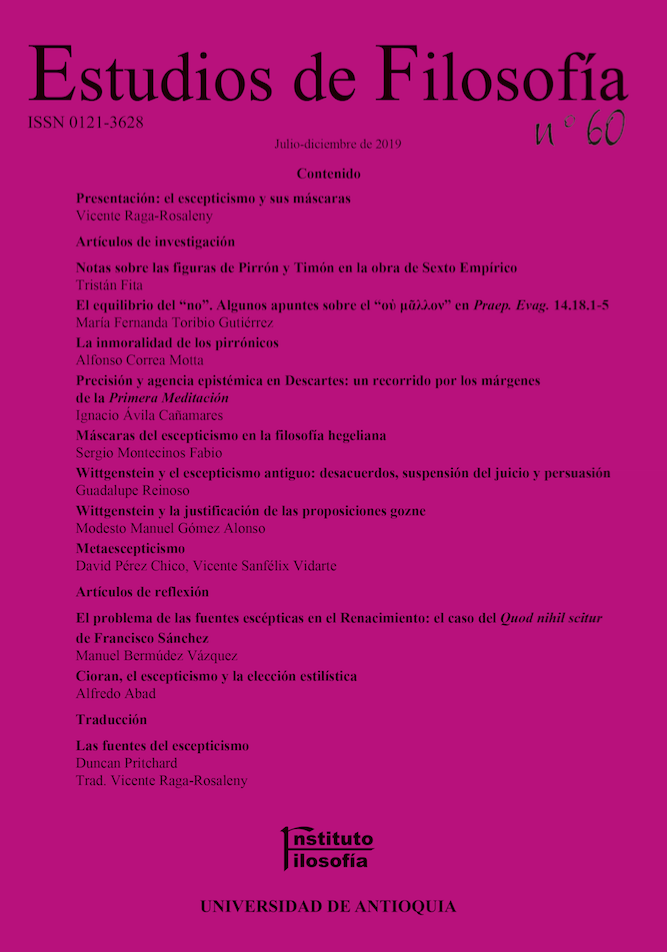Accuracy and epistemic agency in Descartes: an exploration of the margins of the First Meditation
DOI:
https://doi.org/10.17533/10.17533/udea.ef.n60a05Keywords:
Descartes, accuracy, pure enquiry, epistemic akrasia, epistemic agency, Pascal’s wagerAbstract
In this paper I advance a reading of the contours of the First Meditation. I try to bring out an important dimension of Descartes’s thinking about the virtue of accuracy. I contrast the concern for the truth in daily life and in the Cartesian inquiry. I explore the way in which Descartes faces some epistemic risks in the course of his meditation and highlight some aspects of his conception of epistemic agency. And, nally, I conclude with a brief note about Pascal’s wager.
Downloads
References
Battaly, H. (2014). “Varieties of Epistemic Vice”. En Matheson, J. and Vitz, R. (Eds.), The Ethics of Belief. Oxford: Oxford University Press.
Broughton, J. (2002). Descartes’s Method of Doubt. Princeton y Oxford: Princeton University Press.
Carriero, J. (2009). Between two Worlds: A Reading of Descartes’s Meditations. Princeton & Oxford: Princeton University Press.
Descartes, R. (2009). Meditaciones acerca de la filosofía primera. Bogotá: Universidad Nacional de Colombia.
Descartes, R. (1997). Discurso del método. Madrid: Alianza.
Descartes, R. (1995). Los Principios de la filosofía. Madrid: Alianza.
Frankfurt, H. (2008). Demons, Dreamers, and Madmen: The Defense of Reason in Descartes’s Meditations. Princeton y Oxford: Princeton University Press.
Hookway, C. (2001). Epistemic Akrasia and Epistemic Virtue. En Fairweather, A., & Zagzebski, L. (Eds.), Virtue Epistemology: Essays on Epistemic Virtue and Responsibility. Oxford: Oxford University Press.
Larmore, C. (2014). The First Meditation: Skeptical Doubt and Certainty. En Cunning, D. (Ed.), The Cambridge Companion to Descartes’ Meditations (pp. 48-67). Cambridge: Cambridge University Press.
Newman, L. (2008). Descartes on the Will in Judgment. En Broughton, J. & Carriero, J. (Eds.), A Companion to Descartes (pp. 334-352). Oxford: Blackwell.
Nietzsche, F. (1997). El anticristo. Madrid: Alianza.
Owens, D. (2002). Epistemic Akrasia. The Monist, 85(3), 381-397.
Owens, D. (2008). Descartes’s Use of Doubt. En Broughton, J. & Carriero, J. (Eds.), A Companion to Descartes (pp. 164-178). Oxford: Blackwell.
Pascal, B. (2008). Pensamientos. Madrid: Cátedra.
Soteriou, M. (2013). The Mind’s Construction. The Ontology of Mind and Mental Action. Oxford: Oxford University Press.
Tugendhat, E. (2018). Retractaciones sobre la honestidad intelectual. En Antropología en vez de metafísica. Barcelona: Gedisa.
Williams, B. (2005). Descartes: The Project of Pure Enquiry. London y New York: Routledge.
Williams, B. (2002). Truth and Truthfulness. An Essay in Genealogy. Princeton y Oxford: Princeton University Press.
Williams, B. (1973). Deciding to Believe. En Problems of the Self. Cambridge: Cambridge University Press.
Wilson, M. (1990). Descartes. México: UNAM
Published
How to Cite
Issue
Section
Categories
License
Copyright (c) 2019 Ignacio Ávila Cañamares

This work is licensed under a Creative Commons Attribution-NonCommercial-ShareAlike 4.0 International License.
Authors who publish with this journal agree to the following terms:
1. The Author retains copyright in the Work, where the term "Work" shall include all digital objects that may result in subsequent electronic publication or distribution.
2. Upon acceptance of the Work, the author shall grant to the Publisher the right of first publication of the Work.
3. The Author shall grant to the Publisher a nonexclusive perpetual right and license to publish, archive, and make accessible the Work in whole or in part in all forms of media now or hereafter known under a Creative Commons Attribution-NoCommercia-ShareAlike (CC BY-NC-SA 4.0), or its equivalent, which, for the avoidance of doubt, allows others to copy, distribute, and transmit the Work under the following conditions: (a) Attribution: Other users must attribute the Work in the manner specified by the author as indicated on the journal Web site;(b) Noncommercial: Other users (including Publisher) may not use this Work for commercial purposes;
4. The Author is able to enter into separate, additional contractual arrangements for the nonexclusive distribution of the journal's published version of the Work (e.g., post it to an institutional repository or publish it in a book), as long as there is provided in the document an acknowledgement of its initial publication in this journal;
5. Authors are permitted, and Estudios de Filosofía promotes, to post online the preprint manuscript of the Work in institutional repositories or on their Websites prior to and during the submission process, as it can lead to productive exchanges, as well as earlier and greater citation of published work (see The Effect of Open Access). Any such posting made before acceptance and publication of the Work is expected be updated upon publication to include a reference to the Estudios de Filosofía's assigned URL to the Article and its final published version in Estudios de Filosofía.















